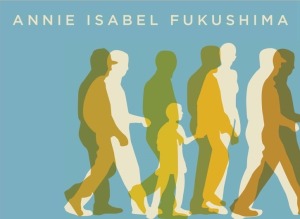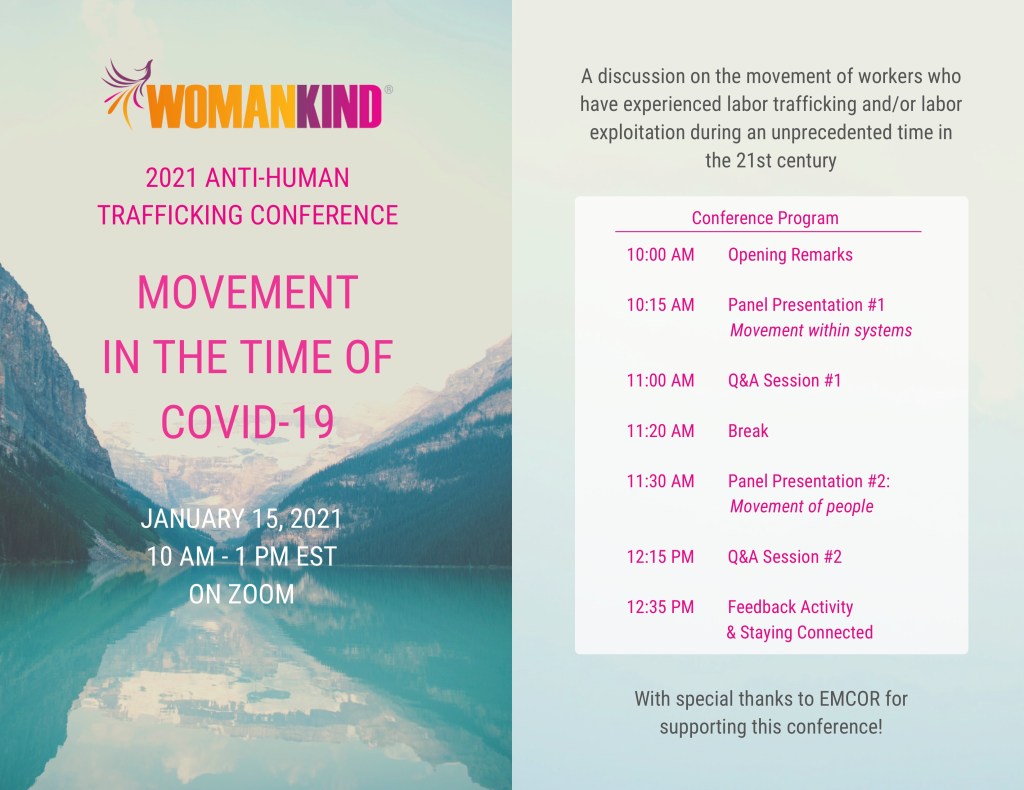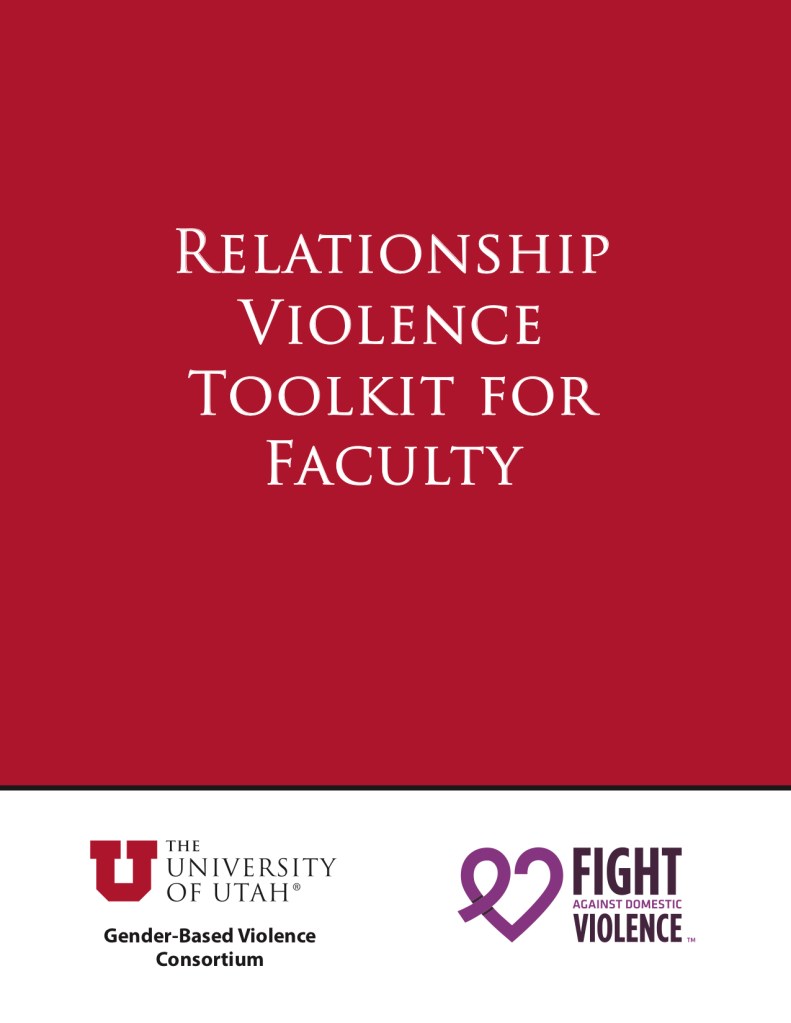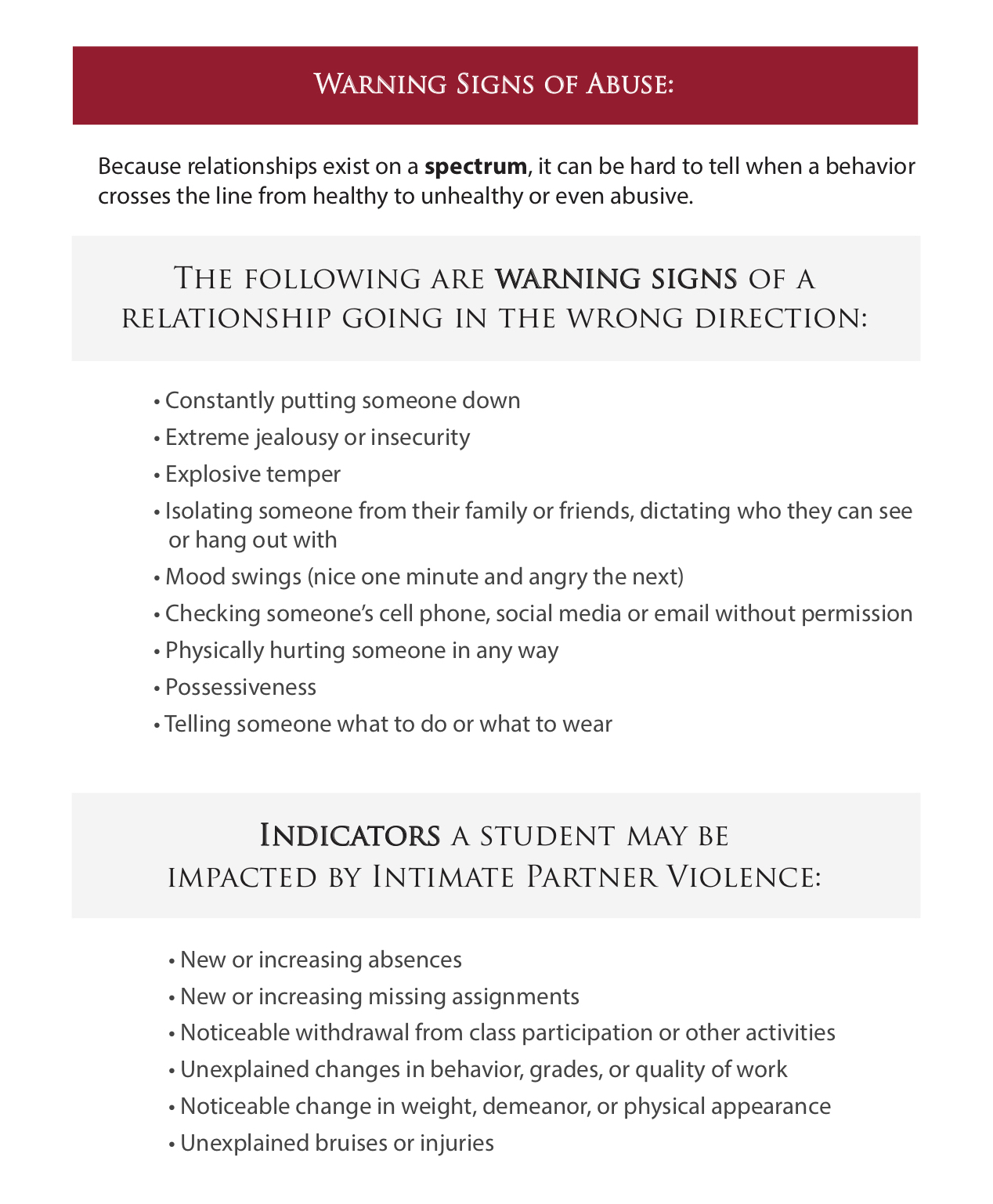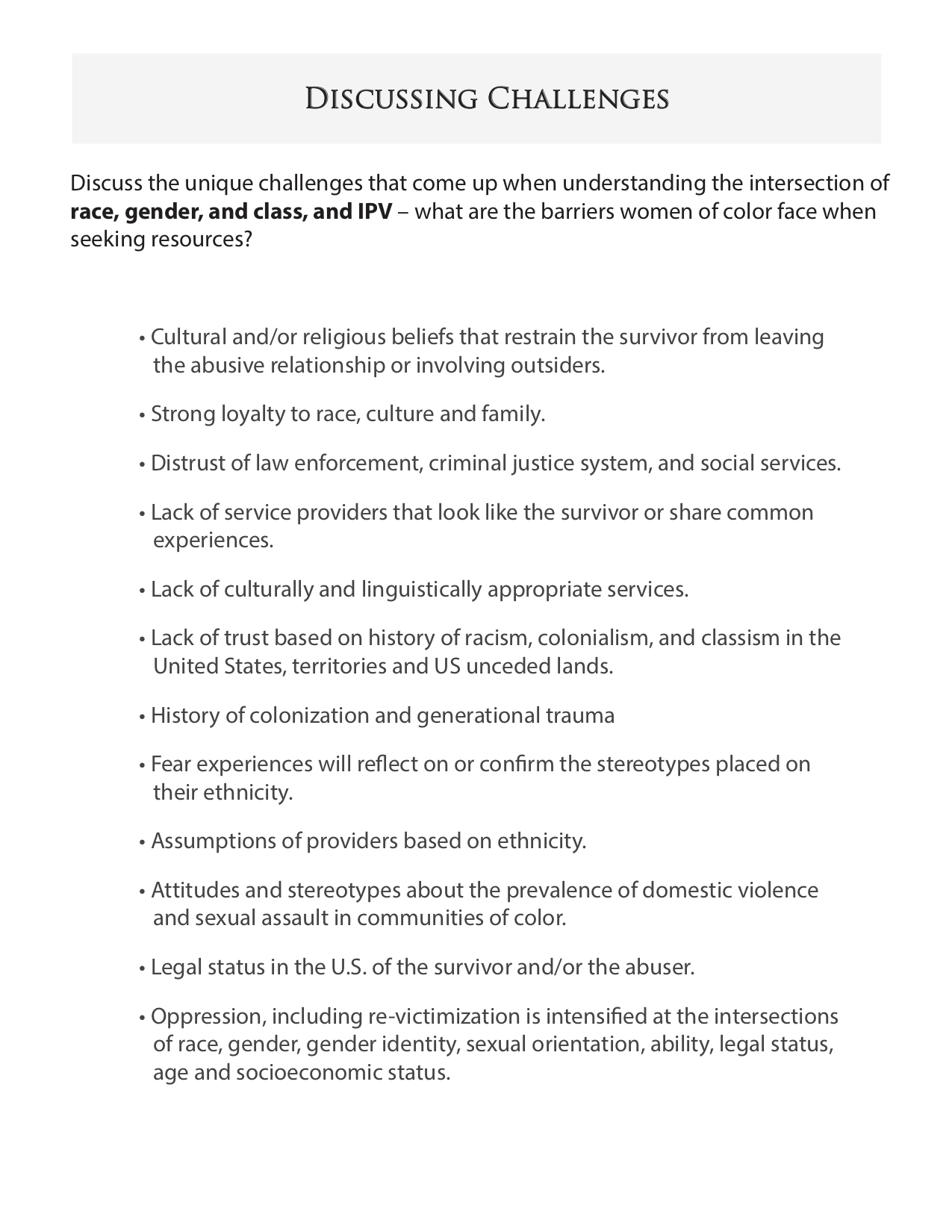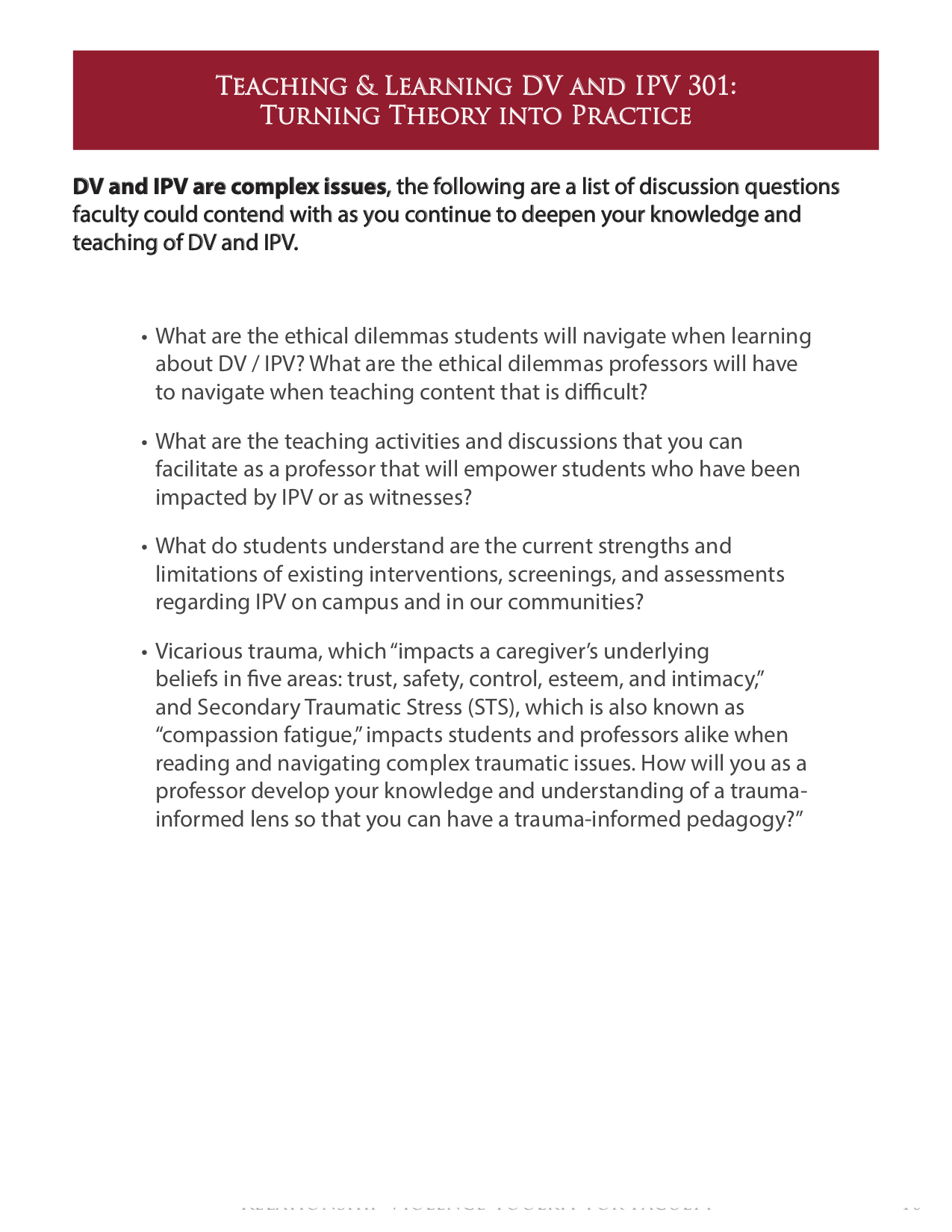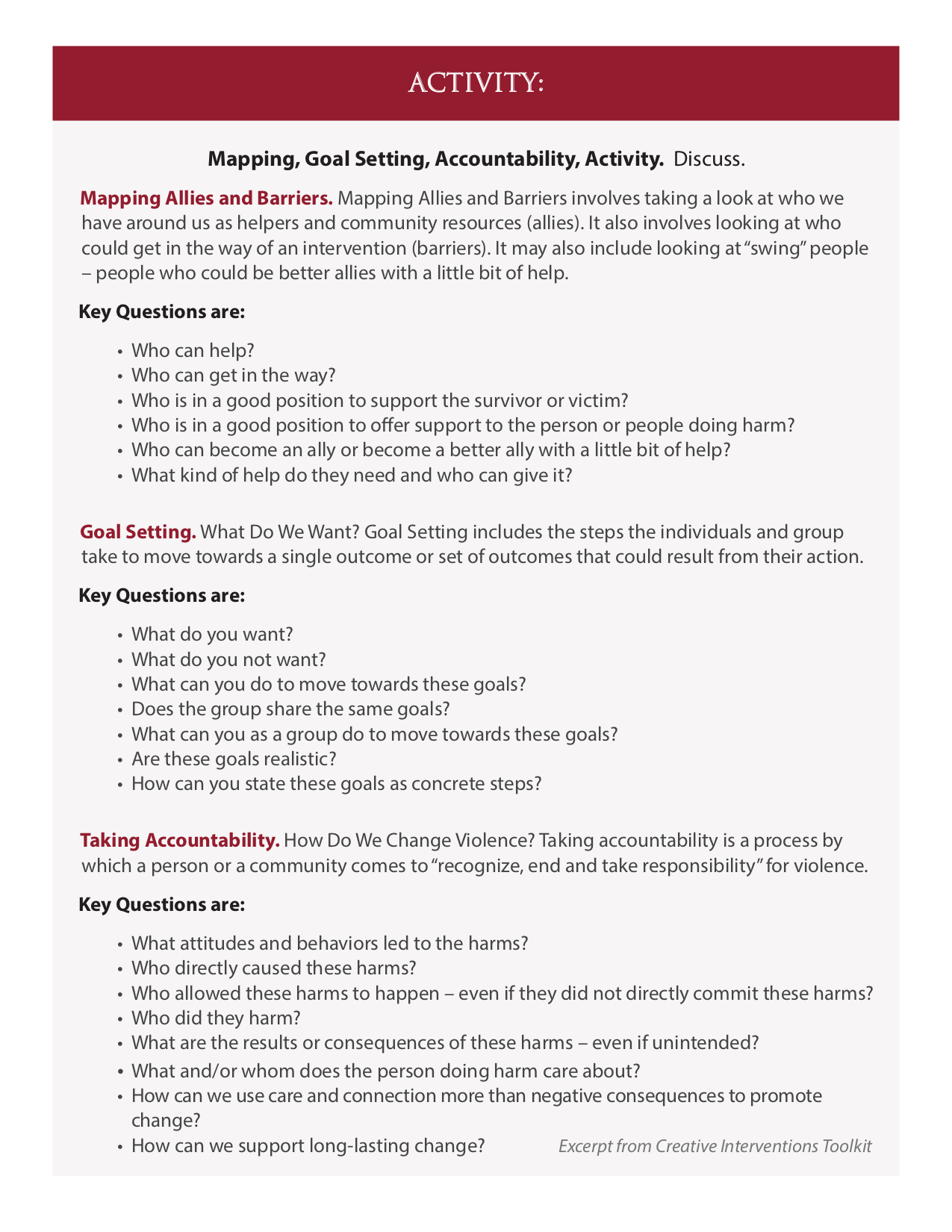Category Community Engagement
Women’s Week 2021
I have been honored to take on the role as committee chair for the University of Utah’s Women’s Week Committee. For the past ten years, this has emerged as an inspiring list of events that honors womxn, celebrates womxn, and recognizes the important work of womxn leaders. This year’s theme is entitled, “Inspiring a Movement” where we take queue from women leaders to imagine our own leadership roles within – that movements paving the way for societal change have been deeply inspired by womxn leading the way. I am a huge Amber Ruffin fan and was over the moon when she agreed to be our keynote. In addition to hearing from Ruffin, our week of events will include workshops on women who run, leadership workshops from health sciences, we will hear from women in office, and end the week with healing and moving the needle – literally and with visions for social change.
https://diversity.utah.edu/ww/




Human Rights: Fair Food at the Kitchen Table

National Underground Railroad Freedom Center
Friday, January 22, 2021 | 2:00 pm – 3:00 pm
Location
Online Via Zoom
Event Type
Panel Discussion, Online
Cost
Free
The agricultural industry has many historical ties to slave economies of the past including the demand for cheap labor and commodities. In fact, migrant farm work continues to be one of the most exploited labor sectors in the United States. Migrant labor has been essential for the agricultural industry in western states such as California and Oregon as well as the Mid-West and across the nation. This discussion will focus on the experiences of migrant farm workers to better understand how their working conditions and rights are central to combating human trafficking and ensuring a just food system. Experts will discuss the legacies of slave economies and immigration law on contemporary migrant farm workers’ rights as well as the ongoing farmworker civil rights movement to ensure their fair treatment. The discussion will also highlight the ongoing work of the Coalition for Immokalee Workers, an internationally recognized farmworker organization, and feature two anti-trafficking scholar-activists. Participants will learn about how the struggle for fair wages, work safety, and the human rights of farm workers is central to combating unfreedom today.
The Coalition for Immokalee Workers is a worker-based human rights organization internationally recognized for its achievements in fighting human trafficking and gender-based violence at work. The CIW is also recognized for pioneering the design and development of the Worker-driven Social Responsibility paradigm, a worker-led, market-enforced approach to the protection of human rights in corporate supply chains. Two CIW speakers will join the webinar, Uriel Zelaya-Perez and Silvia Perez.
Dr. Jennifer Suchland is a scholar-activist and associate professor at Ohio State University with over a decade of research and advocacy experience in human trafficking and critical human rights. Her expertise in legal and feminist studies focuses on the intersections between economic, gender, and racial justice. She currently is an ACLS/Mellon Foundation Scholars & Society fellow (2020-2021) at the National Underground Railroad Freedom Center collaborating on a project entitled Abolition Today.
Dr. Annie Isabel Fukushima is a KoreXicana scholar-activist and assistant professor at the University of Utah with expertise is in labor, migration, and human trafficking. She has published widely on these topics including her recent award-winning book, Migrant Crossings: Witnessing Human Trafficking in the U.S. In addition to her extensive scholarship, she is a frequent community consultant on issues relating to human trafficking and migrant rights and is a member of the Freedom Network.
Registration is required:
WomanKind – 2021 Anti-Human Trafficking Conference
Women of Color Academics Publishing Books
Relationship Violence Toolkit for Educators
During #DVAM2020 the University of Utah’s Gender-Based Violence Consortium partnered with Fight Against Domestic Violence to create the “Relationship Violence Toolkit for Educators.” The toolkit is for educators, where content is organized to include suggestions for teaching from those new to the issues (101) to those more advanced in their knowledge (201 and 301).
The Gender-Based Violence Consortium at the University of Utah brings together an interdisciplinary team of scholars representing multiple colleges across campus. The consortium is an inter-professional collaboration, a campus scholarly network that embodies an academic commitment to sharing knowledge, supporting long-term collaborations through research hubs, creating programming, sharing teaching and responding to gender-based violence in Utah.
The mission of Fight Against Domestic Violence is to generate resources for domestic violence survivors and service providers through corporate, individual, and community partnerships.
Special acknowledgements to the authors and co-creators of the toolkit: Brooke Muir (Fight Against Domestic Violence), Heather Harris, Dr. Jessie Lynn Richards (University of Utah), Dr. Annie Isabel Fukushima (University of Utah), and Diane Le Strain (University of Utah).
To receive updates about gender-based violence, learn more about how you may be involved, please contact Dr. Annie Isabel Fukushima gbvc@utah.edu.
Title IX
Summary of Title IX Final Rule
NVRDC Fact Sheet about new Title IX Regulations
Links for Title IX Coordinators & Reporting Procedures for students
Issues students face:
- Confidential v. nonconfidential resources
- Roles of mandated reporters – students, faculty, staff
- Student legal representation, particularly low-income survivors
- Safety v. prevention initiatives
- Re-traumatization
Resources
Professors’ Experiences With Student Disclosures of Sexual Assault and Intimate Partner Violence: How “Helping” Students Can Inform Teaching Practices
Branch, Kathryn A ; Hayes-Smith, Rebecca ; Richards, Tara N
Feminist Criminology, 2011-01, Vol.6 (1), p.54-75
Survivors of Gendered Violence in the Feminist Classroom
Lee, Janet
Violence Against Women, 2008-12, Vol.14 (12), p.1451-146
Seeing Life in their Shoes: Fostering Empathy Toward Victims of Interpersonal Violence through Five Active Learning Activities
Clevenger, Shelly ; Navarro, Jordana N ; Gregory, Lydia K
Journal of Criminal Justice Education, 2017-07-03, Vol.28 (3), p.393-410
https://www.utcourts.gov/abuse/protective_orders.html
https://nationallatinonetwork.org/images/files/NO_MAS_INFOGRAPHIC.pdf
https://nationallatinonetwork.org/images/Latin_DV_Stats.pdf
doj.state.or.us/wp-content/uploads/2017/08/women_of_color_network_facts_domestic_violence_2006.pdf
https://wocninc.org/wp-content/uploads/2018/11/DVFAQ-1.pdf
How to Support
Utah’s Domestic Violence Coalition
Utah Coalition Against Sexual Assault
Rape Recovery Center Crisis Line 801-467-7273
Campus Resources
Contact a Victim Advocate advocate@sa.utah.edu
University Police 801-585-2677
University of Utah GBVC covered in the Salt Lake Tribune
Thank you to Becky Jacobs and the Salt Lake Tribune for covering the University of Utah’s Gender-Based Violence Consortium. So appreciative of the coverage to raise visibility about the consortium. Not only is it informational, but Jacobs shares resources for survivors who may be reading content and experiencing violence. Raising awareness as one is raising consciousness.
Visit the link to read the full article.
University of Utah researchers team up to study gender-based violence in state
by Becky Jacobs
“A Praxis of Witnessing in these Migratory Times”
Spring/summer 2020 issue of the section newsletter Check out my featured write-up on “A Praxis of Witnessing in these Migratory Times” https://www.asanet.org/sites/default/files/asa_aa_section_newsletter_spring_2020_rev.pdf
Witnessing Human Trafficking, Narrating Lives Beyond Violence – Lawyers Club of San Diego Human Trafficking Collaborative
June 24, 2020 at 12PM PDT
Free Webinar.
Presenters: Drs. Annie Isabel Fukushima & Julietta Hua

The Sociology of Human Rights and COVID-19.
Footnotes: A publication of American Sociological Association’s May/June 2020 special issue is a Special Issue: Sociologists and Sociology during COVID-19. My co-authored article, “The Sociology of Human Rights and COVID-19,” is included; this submission is co-authored with Joachim J. Savelsberg, an amazing human rights sociologist at University of Minnesota.
Four axioms show the effect of the COVID-19 situation on human rights and the relevance of the sociology of human rights in the current era. Each axiom is followed by U.S. (Fukushima) and global (Savelsberg) illustrations.
Gender-Based Violence Consortium Community Meeting – May 26
To learn about some of the GBVC and community partner research endeavors, please join us for our community meeting on May 26 at 4:30PM. To join, please register: https://bit.ly/GBVCMay2020
Presentations from Dr. Sharon Talboys, Dr. Sonia Salari, Dr. Chris Linder, and my student Kwynn Gonzalez-Pons.
Webinar: Witnessing Human Trafficking, Narrating Lives Beyond Violence, June 24
Lawyers Club of San Diego
June 24, 2020 at 12PM PDT
Presenters: Drs. Annie Isabel Fukushima & Julietta Hua
Multiplicity of stigma: cultural barriers in anti-trafficking response
https://www.emerald.com/insight/content/doi/10.1108/IJHRH-07-2019-0056/full/html
Annie Isabel Fukushima, Kwynn Gonzalez-Pons, Lindsay Gezinski, Lauren Clark
Abstract
Purpose
The purpose of this study is to contribute to the social understanding of stigma as a societal and cultural barrier in the life of a survivor of human trafficking. The findings illustrate several ways where stigma is internal, interpersonal and societal and impacts survivors’ lives, including the care they receive.
Design/methodology/approach
This study used qualitative methods. Data collection occurred during 2018 with efforts such as an online survey (n = 45), focus groups (two focus groups of seven participants each) and phone interviews (n = 6). This study used thematic analysis of qualitative data.
Findings
The research team found that a multiplicity of stigma occurred for the survivors of human trafficking, where stigma occurred across three levels from micro to meso to macro contexts. Using interpretive analysis, the researchers conceptualized how stigma is not singular; rather, it comprises the following: bias in access to care; barriers of shaming, shunning and othering; misidentification and mislabeling; multiple levels of furthering how survivors are deeply misunderstood and a culture of mistrust.
Research limitations/implications
While this study was conducted in a single US city, it provides an opportunity to create dialogue and appeal for more research that will contend with a lens of seeing a multiplicity of stigma regardless of the political climate of the context. It was a challenge to recruit survivors to participate in the study. However, survivor voices are present in this study and the impetus of the study’s focus was informed by survivors themselves. Finally, this study is informed by the perspectives of researchers who are not survivors; moreover, collaborating with survivor researchers at the local level was impossible because there were no known survivor researchers available to the team.
Practical implications
There are clinical responses to the narratives of stigma that impact survivors’ lives, but anti-trafficking response must move beyond individualized expectations to include macro responses that diminish multiple stigmas. The multiplicity in stigmas has meant that, in practice, survivors are invisible at all levels of response from micro, meso to macro contexts. Therefore, this study offers recommendations for how anti-trafficking responders may move beyond a culture of stigma towards a response that addresses how stigma occurs in micro, meso and macro contexts.
Social implications
The social implications of examining stigma as a multiplicity is central to addressing how stigma continues to be an unresolved issue in anti-trafficking response. Advancing the dynamic needs of survivors both in policy and practice necessitates responding to the multiple and overlapping forms of stigma they face in enduring and exiting exploitative conditions, accessing services and integrating back into the community.
Originality/value
This study offers original analysis of how stigma manifested for the survivors of human trafficking. Building on this dynamic genealogy of scholarship on stigma, this study offers a theory to conceptualize how survivors of human trafficking experience stigma: a multiplicity of stigma. A multiplicity of stigma extends existing research on stigma and human trafficking as occurring across three levels from micro, meso to macro contexts and creating a system of oppression. Stigma cannot be reduced to a singular form; therefore, this study argues that survivors cannot be understood as experiencing a singular form of stigma.
Keywords
Acknowledgements
The researchers would like to acknowledge the funds received from the Salt Lake City Mayor’s Office, Dr Jennifer Seelig, the Salt Lake City Council and the Salt Lake County District Attorney’s Office, which supported a city-wide needs assessment. The findings and recommendations presented in this article are those of the authors and do not represent the official positions or policies of the Salt Lake City Mayor’s Office, the Salt Lake City Council or the Salt Lake County District Attorney’s Offices. The authors would also like to thank the Social Research Institute of the College of Social Work at University of Utah and graduate assistance from Allison O’Connor, MSW, LCSW and Lyndsi Drysdale. Additionally, the authors are grateful to the guest editor Dr Sarbinaz Bekmuratova, the anonymous reviewers and the editorial team at the International Journal of Human Rights in Healthcare.
Citation
Fukushima, A.I., Gonzalez-Pons, K., Gezinski, L. and Clark, L. (2020), “Multiplicity of stigma: cultural barriers in anti-trafficking response”, International Journal of Human Rights in Healthcare, Vol. ahead-of-print No. ahead-of-print. https://doi.org/10.1108/IJHRH-07-2019-
Mobility & Temporality – May the 4th with Migratory Times
May 4th, 10AM PDT / 1PM EDT / 7PM CEST
Register
bit.ly/migratorytimessalon

You are invited to a Salon on Mobility & Temporality with Migratory Times. Migratory Times is a project of the Institute of (im)Possible Subjects and Center for Arts, Design and Social Research. IiS is a transnational feminist collective producing art and education events and a collectively edited online open access journal of art and writing. Center for Arts, Design and Social Research, Inc., US based non-profit 501(c)3 organization supporting independent arts, design, and research focused on positive social impact, globally.
With Crystal Baik (University of California, Riverside), Anyely Marin and Rebecca Close (Critical Dias, Spain), José Manuel Cortez (University of Oregon), Romeo García (University of Utah), Latipa (University of California, Riverside), Jackline Kemigisa (Uganda), Isabelle Massu (Institut des Beaux Arts de Besançon, France), Alejandro Perez (Berkeley City College), Jennifer Reimer (FWF Lise Meitner), Daphne Taylor-Garcia (University of California, San Diego).
Facilitators: Annie Isabel Fukushima & Dalida Maria Benfield (Migratory Times)
“Witnessing in a Time of Homeland Futurities”
Download article: https://www.academia.edu/42871374/Witnessing_in_a_Time_of_Homeland_Futurities
Annie Isabel Fukushima from the University of Utah speaks about her article “Witnessing in a Time of Homeland Futurities”, due to be published on 27 April. “Current US rhetorical strategies of imagining a future of the homeland have led to the creation and utilisation of new technologies to contain and manage the border. These responses to the US border and immigration impact anti-trafficking efforts, sustaining a ‘homeland futurity’. Homeland futurity draws on and extends discourses of emergency that solidify borders as dangerous and risky. This article traces how homeland futurities emerged in US anti-trafficking efforts. Drawing upon interviews and focus group discussions with service providers and survivors of violence in San Francisco, the article demonstrates how migrant labourers are impacted by a discourse of threat and containment of the border. However, migrant labourers and their allies are innovating to secure a life that mitigates risk through migrant labourers’ use of technology. This article illustrates through the example of Contratados.org how technology may facilitate opportunities of future visioning by migrant labourers beyond a homeland futurity, to enact practices that bring to the centre migrants and their experiences through social networking and information sharing on job prospects.”
Publication of Issue 14 of Anti-Trafficking Review, ‘Technology, Anti-Trafficking, and Speculative Futures’
Guest Editors: Jennifer Musto and Mitali Thakor Editor: Borislav Gerasimov
Over the past decade, scholars, activists, and policymakers have repeatedly called for an examination of the role of technology as a contributing force to human trafficking and exploitation. Attention has focused on a range of issues – from adult services websites and the use of social media to recruit victims to the utilisation of data analytics software to understand trafficking and identify ‘hotspots of risk’. At the same time, technology has also been positioned as a disruptor of human trafficking that can be reworked and transformed ‘from a liability into an asset’. Yet, critical anti-trafficking scholars have cautioned that claims about the relationship between technology and trafficking rely on limited data and a number of assumptions.
The new issue of Anti-Trafficking Review explores these assumptions and the currently available technological tools that purport to address trafficking and exploitation. An article by Sanja Milivojevic, Heather Moore, and Marie Segrave traces the discourse surrounding technology and (anti-)trafficking since the early 2000s and outlines four common myths on which it is built. The authors call for more evidence but also more attention to issues such as fair labour migration regimes and decent work. Three articles – by Stephanie Limoncelli; Laurie Berg, Bassina Farbenblum, and Angela Kintominas; and Annie Isabel Fukushima – analyse various apps developed with the goal of combating exploitation. They show that many of these apps have limited, if any, benefit for trafficked persons or at-risk groups, while largely reinforcing neoliberal economic ideologies about the limited role of governments in regulating businesses. Such apps can only be useful when they are developed by, for, and with the people meant to use them, as Fukushima’s article demonstrates. Another three articles focus on the practice of shutting down websites hosting sex work ads as a way to reduce trafficking in the sex industry. Samantha Majic compares the public reactions to the shutting down of MyRedbook and Rentboy – sites used by, respectively, female and gay male sex workers. She urges the LGBT movement to overcome its ‘respectability politics’ and show greater solidarity with the sex worker rights movement. Erin Tichenor’s article documents the impact of the shutting down of Backpage on sex workers in New Zealand, while Danielle Blunt and Ariel Wolf examine the impact of the same in the United States. Both articles demonstrate how closing sex work ads sites has negative economic and emotional consequences for sex workers. Writing from the perspective of an NGO providing direct assistance to trafficked persons, Isabella Chen and Celeste Tortosa reflect on the use of digital evidence in human trafficking investigations and prosecutions. In the final article, Kate Mogulescu and Leigh Goodmark show what happens to survivors of human trafficking who are prosecuted as traffickers and placed on sex offender registries in the United States.
Taken together, the articles in this Special Issue converge around one central point: the factors that enable and sustain human trafficking and exploitation are complex and require political will – not tech solutionist fixes. Anti-traffickers’ obsession with technological ‘solutions’ draws attention and resources away from issues such as decent work, gender, economic and racial justice, the free movement of people, and quality public services. In the current COVID-19 pandemic it is more urgent than ever to re-focus on these larger socio-economic and political issues.
https://www.antitraffickingreview.org/index.php/atrjournal
For all contributions:
- Editorial: Between Hope and Hype: Critical evaluations of technology’s role in anti-trafficking
Jennifer Musto, Mitali Thakor, Borislav Gerasimov1-14 - Freeing the Modern Slaves, One Click at a Time: Theorising human trafficking, modern slavery, and technology
Dr Sanja Milivojevic, Heather Moore, Marie Segrave16-32 - There’s an App for That? Ethical consumption in the fight against trafficking for labour exploitation
Stephanie A. Limoncelli33-46 - Addressing Exploitation in Supply Chains: Is technology a game changer for worker voice?
Dr Laurie Berg, Bassina Farbenblum, Angela Kintominas47-66 - Witnessing in a Time of Homeland Futurities
Dr Annie Isabel Fukushima67-81 - Same Same but Different? Gender, sex work, and respectability politics in the MyRedBook and Rentboy closures
Samantha Majic82-98 - ‘I’ve Never Been So Exploited’: The consequences of FOSTA-SESTA in Aotearoa New Zealand
Erin Tichenor99-115 - Erased: The impact of FOSTA-SESTA and the removal of Backpage on sex workers
Danielle Blunt, Ariel Wolf117-121 - The Use of Digital Evidence in Human Trafficking Investigations
Isabella Chen, Celeste Tortosa122-124 - Surveillance and Entanglement: How mandatory sex offender registration impacts criminalised survivors of human trafficking
Kate Mogulescu, Leigh Goodmark
A Survey of Child Welfare and Labor Trafficking in California: A White Paper
Download the full White Paper:
The purpose of this study is to better understand how the welfare system is currently identifying children (under 18-years-old) who experience being labor trafficked for commercial labor – work beyond sexual economies. This study is a survey of individuals working in California, where 186 participants were invited to respond to a questionnaire between September 23, 2019 and November 30, 2019. The majority of those who responded to the survey worked in the child welfare system. This study reveals, child welfare workers, probation officers / juvenile justice system workers, and non-governmental organizations are working with children who have been labor trafficked. What was discovered after conducting a survey: 25% of the participants confirmed working with children who were labor trafficked, 25% did not know if they had worked with children who were labor trafficked, and 50% were providing services to or supporting children who work for pay. Children were informally identified as working in a range of industries including agriculture / farm work, construction, forced commercial sexual economies, forced drug sales, forced human smuggling, forced theft/stealing, housekeeping/domestic work, janitorial, massage parlor/massage, nail/hair salon, pan handling/begging, restaurant work, retail, and other. Based on these preliminary findings, this study recommends the following next steps:
- There is an immediate need to develop protocols and train child welfare workers on child labor trafficking, similarly to how such professionals are being trained on child sex trafficking.
- There is a need to deepen an understanding of child welfare and juvenile justice system’s responses to child labor and sex trafficking through research; in particular on evidence-based research that may determine promising practices for prevention and early identification of all forms of human trafficking affecting children.
- It is recommended that California State Agencies and local organizations broaden their awareness raising efforts to encompass education on children’s experience with work and the continuum of labor violations and trafficking.
- Prevention of child labor trafficking is much needed, therefore, more data on children who experience labor exploitation on the continuum of labor violation and trafficking is needed. Statewide data collection systems have been designed to capture prevalence of child sexual exploitation, however, less understood is the range of labor violations, recruitment and industries children may be experiencing commercial exploitation.
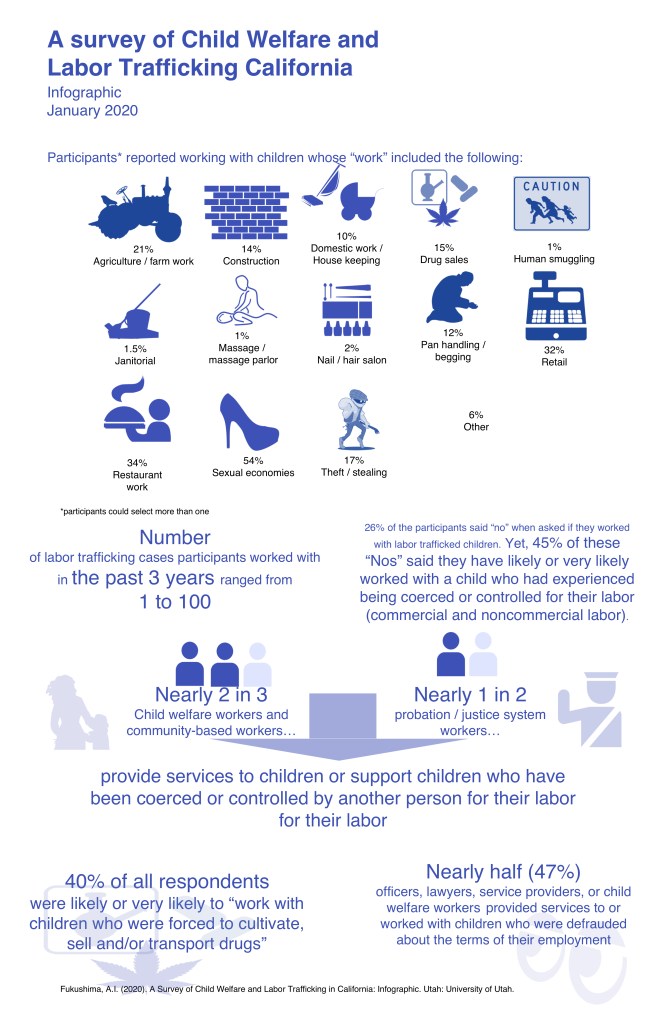
Community Needs Assessment Report Presentation
September 26, 2018 presentation to the Commission on the Status of Women, City Hall, San Francisco.
Xicanx/Latinx Heritage Month Keynote Speaker.
General
Announcement!
Xicanx/Latinx Heritage Month Keynote Speaker.
You are invited to a plática/ talk featuring Annie Isabel Fukushima, Ph.D., Assistant Professor, Ethnic Studies at the University of Utah and author of the upcoming: Migrant Crossings: Human Trafficking in the United States
11:00 AM, Wednesday, September 26th in Berkeley City College Rm. 216
Dr. Annie Isabel Fukushima is Assistant Professor in the Division of Ethnic Studies at the University of Utah. In addition, she has served as an expert witness for human trafficking cases in California and Colorado, and a consultant, recently producing the Grant Management Toolkit for Office for Trafficking in Persons. Her most recent projects have been funded by the San Francisco Department on the Status of Women (2018) and the Abundance Foundation (2016 – 2017).
Dr. Fukushima has published extensively on human trafficking, intimacy and race, and immigration. Her upcoming interdisciplinary work examines Asian and Latinas trafficked into the United States. She reminds us, “In spite of the violence as systemic and naturalized, survivors are always resisting.”
Sponsored by Ethnic Studies and Mexican/Latin American Studies at Berkeley City College
This message was sent from the Berkeley City College Public Information Office. For further information call 510-981-2852.
Felicia Bridges, Ed.D
Public Information Officer
Berkeley City College
(510) 981-2852
Violence Against Women Needs Assessment Community Presentation

You are invited to attend a community presentation hosted by the University of Utah and the Department on the Status of Women, “Violence Against Women Needs Assessment.” The presentation will include University of Utah’s findings from the San Francisco Violence Against Women Needs Assessment. The findings will be presented by Dr. Annie Isabel Fukushima, the project’s Principal Investigator. This event is co-hosted with the San Francisco Department on the Status of Women.
Event Details:
Date & Time: Friday, June 22, 2018, 3-5:30pm.
Event Location: 25 Van Ness Avenue, Suite 610, San Francisco, CA.
The Violence Against Women Needs Assessment is a study conducted by the University of Utah. The study was made possible through a grant funded by the San Francisco Department on the Status of Women (2018).
Catering will be provided by Eat Suite.
Please RSVP by June 8th for planning purposes. However, anyone and everyone in the community is welcome to attend regardless of your RSVP.
Should you have questions about the event, food allergies, dietary restrictions, need accommodations, need translation, or would prefer to RSVP by email, please contact Elizabeth Boley at ecboley[at]gmail[dot]com or visit http://evite.me/rh9PPbyQew
Grant Management Toolkit: Building Sustainable Anti-Trafficking Programs.
Archives: Annie Fukushima & Cindy Liou On Human Trafficking

